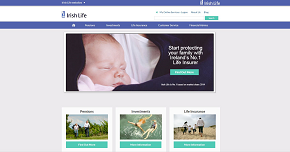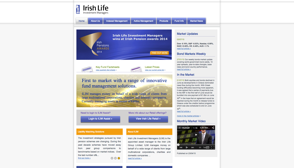Christmas is always a good time for some quiet reflection, so with that in mind we’ve decided to run through just some of 2012’s developments which have implications for the Irish pensions industry, and company pension schemes in particular. Below is a quick look back at some of the things that happened in 2012 which will influence the way company pension schemes are run in 2013 and beyond.
The continued decline of Defined Benefit Schemes, the continued growth of Defined Contribution Schemes
This has been a prominent topic in the Irish pensions industry over the last few years as rising life expectancies, poor investment returns and declining bond yields have made it difficult for companies to fund their Defined Benefit schemes. Most of these schemes are now closed to new entrants and many closed completely. This year Irish Life Corporate Business hosted a well-received conference on the subject in the Convention Centre Dublin in March. If you want a recap of what was covered at that conference, you can still visit our website dedicated to the conference via the link below.
The Pensions Board published new funding standards rules for Defined Benefit Schemes:
Very much related to the above point, in June the Pensions Board published new funding standard rules for Defined Benefit Schemes. The key points of the new funding regime in place from June 2012 are:
- The deadlines for submission of funding proposals are between December 2012 and May 2013.
- Schemes can run their funding proposals up to 31st December 2023 subject to Pensions Board approval.
- From 1st January 2016, schemes have to hold a risk reserve in addition to their Minimum Funding Standard (MFS) reserves. This reserve will apply to any liabilities that aren’t backed by bonds/cash and will be a very substantial additional burden on schemes.
- Where schemes hold sovereign annuities on a bought in basis or sovereign bonds, they will be able to get credit for the lower cost of providing pensions in the annual minimum funding standard test, provided the Trustees resolve to buy sovereign annuities in the event of wind up and communicate this to members.
- Schemes that fail the minimum funding standard test are required to submit a funding proposal.
- In order to get any credit for the lower cost of sovereign annuities in the funding proposal, a scheme is required to fully match pensions in payments with sovereign bonds or annuities at the start of the funding proposal period. This means that schemes have to fully derisk the asset backing for pensions in payment in advance of submitting a funding proposal.
Investment Markets mainly positive
As I write this on the last week before Christmas (19th December to be exact) , it looks as if equity and bond markets will finish 2012 in positive territory despite all the uncertainty that surrounded markets due to the Euro crisis and the election in the USA earlier in the year. Irish Life Corporate Business’s most popular fund, the Consensus fund, has achieved a return of 16.8% from 01/01/2012 to 30/11/2012, whilst the government bond based fund, the Pension Protection fund, has achieved a return of 23.7% over the same period and the Indexed Global Equity fund, a fund made up entirely of equities, achieved a return of 18.3% over the same period.
For more details on how all of our comprehensive range of investment funds have performed in 2012, simply visit our Irish Life Corporate Business Investment Centre via the link below.
http://www.irishlife.ie/corporatebusiness/resources-tools/investment-centre.html
Budget 2013: Marginal Rate tax relief remains
Although the Irish people’s reception of Budget 2013 has been far from positive, one pleasing aspect of the Budget for those who want to fund for a decent pension in retirement was the Minister’s decision not to change the current tax relief arrangements for the coming year. As well as this, Minister Noonan indicated that the Pensions Levy introduced in The Finance (No. 2) Act 2011 would not be extended beyond the original planned end date of 30/06/2014.
The Minister also announced on Budget day that individuals will be allowed a once-off opportunity to make withdrawals from their AVCs prior to retirement. This withdrawal will be limited to 30% of the value of the individual’s AVC fund . He also indicated that from 2014, arrangements will be put in place to cap subsidies for pension funds delivering an income of more that €60,000 per annum.
So overall, Budget 2013 is likely to be viewed as a positive budget for pension savers, preserving tax relief at the marginal rate and providing clarity going forward for the majority of Irish workers who wish to fund for a reasonable standard of living in retirement. For more details on pension-related announcements in Budget 2013, just take a look at our previous blog.
If you’ve any questions or comments on any of the information above, we’d love to hear from you. Finally, thanks a million for reading this blog, and from everyone in Irish Life Corporate Business, we hope you have a great Christmas and a Prosperous New Year! We’ll see you in 2013!








